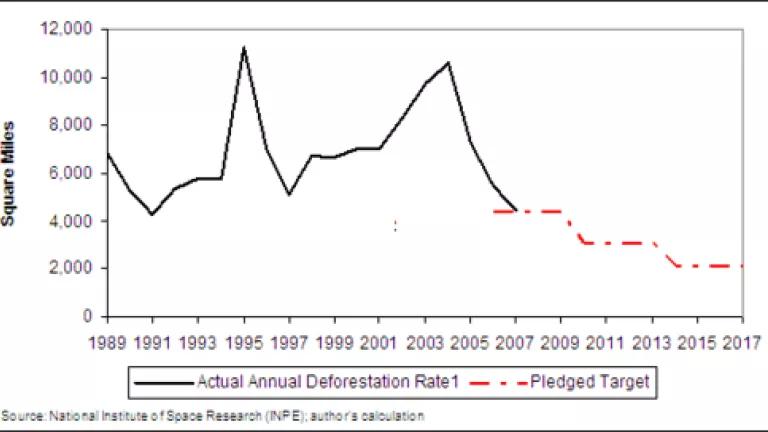
As I briefly discussed on Earthbeat, on Monday Brazilian President Lula da Silva signed a national climate change plan, which included a pledge to cut Brazil's deforestation rate in half from today's levels by 2018 -- from approximately 4,633 to 2,260 square miles (as discussed by Reuters). [Note: It amounts to almost a 70% cut from the average annual rate from 1996-2005 of 7,502 sq. miles (19,000 sq. kilometers), which is the figure included in the report as Point Carbon sub req. reports.]
The reduction in deforestation is to be reduced in stages over defined four year periods through 2017:
- From 2006-2009, deforestation is to be cut to 4,402 sq. miles (11,400 sq. km) -- a 40% cut below the 10-year average used in the plan;
- 2010-2013, a cut to 3,081 sq. miles (7,980 sq. km) -- an additional 30% reduction from the previous four years; and
- 2014-2017, a reduction to 2,157 sq. miles (5,586 sq. km) -- an additional 30% reduction from the previous four years.
Now that is a significant cut in deforestation rates if achieved (see figure which shows the target as the red dashed line and the actual annual rates in black), especially compared with the high rate in 2004.
The early years require essentially no improvement from today's levels (the target through 2009 is roughly the same as the actual 2007 rate). So, it essentially amounts to stabilizing deforestation rates this year and next at last year's levels. But, they'll need to reverse the current trend as recent estimates show that the deforestation rate is on the rise.
If the annual cut in the final years of the plan -- 2,394 sq. miles per year -- are continued for subsequent four year periods (a proposition not included in the plan), deforestation in Brazil could end sometime after 2025. Sounds like an objective worth shooting for, if not sooner.
There is always room to criticize that this plan: isn't aggressive enough, should be faster, much of the real effort occurs after President Lula da Silva is out of office, and still leaves a lot of deforestation at the end -- all fair criticisms (see: Mongabay.com article on the plan and their story on World Wildlife Fund's critiques). We definitely need to work to improve this strategy (e.g., by reducing the rate further and faster) and ensure that the proper laws, programs, etc. are established on the ground to actually deliver this goal.
It does, however, mark a very significant shift for Brazil. They have long argued against establishing targets to reduce their deforestation emissions so any target is definitely a huge step forward in the decades long battle to address deforestation.
And, since deforestation accounts for the majority of Brazil's estimated global warming pollution it potentially marks a major national effort to reduce their emissions. Of course, if achieved. According to one estimate it could achieve a total reduction in emissions of 4.8 billion tons of CO2 (Point Carbon sub req. reports) -- an amount equal to the European Union's total current emissions.
While that is still a lot of deforestation -- too much in many respects -- it is a potentially groundbreaking action if they can meet it.
Of course, the crucial test will be if the government puts in place the necessary policies to achieve these commitments. Their success in addressing deforestation has been a mixed bag of late (as I discussed here), so it will require a sustained effort over many years and real actions on-the-ground. And political support that continues beyond the current Administration, as much of the really steep declines occur after President Lula is out of office.
So an opening has emerged in Brazil's position on global warming (and deforestation emissions in particular) as we head into the crucial debate next year on the shape of global efforts to address deforestation emissions. Positive signs from Poland that can help build some momentum next year as we lead-in to Copenhagen.

